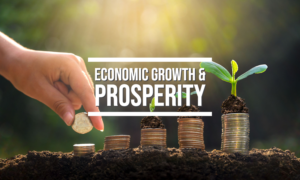 The biggest surprise to me, reading the latest economic statistics, is that people are surprised.
The biggest surprise to me, reading the latest economic statistics, is that people are surprised.
I mean, there are literally thousands of people paid good money to predict the future direction of the economy, and they all got it wrong.
Things are great. Simple as 1, 2, 3.
- The end of the pandemic meant supply chains would return to normal. Regional wars meant demand would hold up.
- The Inflation Reduction Act poured trillions into manufacturing.
- Then there’s AI. I can almost forgive economists for missing that one. Even though it was in all the papers.
AI isn’t just one thing. It’s a collection of technologies that, taken together, require that every computer on the planet get an upgrade. If not now, soon.
This started last year, with the clouds. Nvidia chips got expensive because there was no alternative to Nvidia software for the upgrades needed to write, and use, generative AI applications.
Then there are the clients. PCs must gain the power only gaming PCs had a few years ago. Phones will be upgraded, and we don’t even know how much yet.
AI requires that training data be identified, and vetted, so all the huge data stores companies have been building for a decade have to be looked at.
It means learning an entirely new class of software, and not just easy phone-like stuff. Building and using AI isn’t like ordering an Uber.
Seen This Movie Before

Even before we know the value of this stuff, learning it is a bitch. It’s not like clicking on a browser. We don’t know all it can do. It all must be tested as well as built.
This is almost entirely an American show. The Chinese are just too afraid of how AI can empower people to let it out of its box. The Japanese are too old, the Europeans too preoccupied. The East Asians must upgrade their skills. This is a work of imagination, demanding millions of educated, empowered, free minds. Guess who has them?
There’s going to be a reckoning. There always is. But what we’ve seen so far, from companies like ServiceNow, Salesforce, and Adobe, is impressive. We can clear bottlenecks in customer service. We can automate anything where the productivity gating factor was semi-skilled people.
Why aren’t the economists seeing this? Why are they constantly surprised by the employment numbers, by the GDP numbers? And why do they keep predicting a doom that won’t come?
Because it won’t come until we see the limits of what we’re building. It won’t come until applications disappoint, until upgrades are completed, until the AI plane is in the air. I can’t tell you when that is, but it’s years away. Meanwhile, value will be created, homes will be built, medical care will be improved, and the Roaring 20s are going to roar.
Bad time to be a pessimist.










